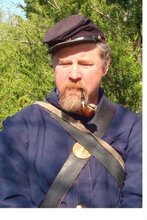
Twenty years ago, I began to research the civil war record of my great-great grandfather, John Robinson Hodges. I wanted to learn as much as I could about him and his unit, the 33rd Missouri Infantry US, and it was during this research that I discovered the Henry Stark Carroll letters. A total of 32 letters were donated to the US Army Military History Institute at Carlisle Barracks, PA. by a grandson, Henry C. Carroll. Written between Aug 31, 1862 and Sep 3, 1863, the Carroll letters offer an interesting glimpse into the life of a common soldier in the Trans-Mississippi arena of the Civil War. Mostly it is a simple tale of camp life, on the march, and on the river aboard steamer's. A few letters tell of skirmishes with the enemy at Fort Pemberton, MS and Helena, AR. Interestingly enough, Henry Stark Carroll was 18 years old when he joined the 33rd Missouri, but he must have impressed all the officers and men, because he was appointed first sergeant of Company D almost immediately. During the June 6, 1864 Battle of Lake Chicot, Arkansas, Henry was wounded in the left foot, which caused him to be hospitalized in Memphis until November 8th of that year. The severity of the wound is not mentioned, nor is covered in these letters, but when he did return to his unit is was as regimental sergeant major and he served in that capacity till the end of the war. I hope you enjoy these letters, because I think they fill a void in an area that is not discussed as commonly as the more popular "war out east".
In the following letter, Henry writes about the 4th of July action at Helena, Arkansas
Helena, Ark July 5th 1863
Dear Mother
I take my pen in hand this morning in haste to inform you that I am in excellent health. You will probably have heard before this reaches you that we have a fight here. And most a bloody one it was too. Yesterday morning we were attacked at half past four o’clock by the rebels under Price, Marmaduke, and Holmes. We were expecting an attack and as I mentioned to Edna the other day in my letter, we were ordered into line every morning before daylight. Yesterday morning, I was up at two o’clock and was engaged in delivering some tools to be used in the rifle pits. I remained up the balance of the night. At half past three the captain ordered me to get the company into line.
Everything was calm and serene and we began to think the rebs had concluded not to attack us. I divided the men into gun squads and scarcely had the men taken their posts ere an officer rode up and ordered us to fire an alarm gun which we did. In ten minutes afterward the enemy attacked our batteries on the left, almost as the fight opened on the right and center. I think the rebels had their whole force engaged.
Our center was headed by two companies of our regiment who were protected by some earthworks in which were planted two brass field pieces. A rebel brigade charged upon this work. They were composed of the 7th, 8th, and 12 Missouri rebel regiments. The ground over which they charged was very broken and the two guns and the infantry in the rifle pits made fearful havoc around them. The fight by this time was raging fearfully all around the lines. All this time, we were standing at our guns. I commanded gun no.6 in Fort Curtis. We loaded first with a shell. The fog was so thick that at the distance or six or seven hundred yards, we could not distinguish our men from the rebels. This was just at sunrise.
Gradually as the sun arose, the fog lifted and cleared away and I could see them coming in to flank the battery on the hill opposite us. I asked the captain if I could give them a Fourth of July salute. He replied to give it to them and thus opened the most murderous fire from our guns that ever men withstood. But nothing seemed to daunt the foolhardiness of the rebels; they came on yelling like Indians all the time. Our men at the batteries were overpowered and compelled to retreat. They retreated to Fort Curtis. The rebs rushed to the top of the hill and formed a new line. They seemed to think they had gained the day, but they were woefully mistaken.
While they were forming, we were throwing shot and shell into them that told fearfully. Their colors were posted in a very conspicuous place and time after time they dropped to the ground (and ) men would rush up and hoist them again but only to be shot down. As soon as they had formed they began to advance toward us. They had to cross seven hundred yards of open ground. They seemed as they intended to take us at the bayonet point. They advanced steadily and briskly while six heavy guns from one fort and also several companies of infantry that had been driven in from the outer works were mowing them down under this murderous fire.
They advanced four hundred yards. They were so close, the day seemed lost in spite of all we could do.
At this distance we poured in a double charge of grape that made them reel and stagger. Their officers waved their swords and tried to urge the men forward but it was of no use. It was not human to stand it. They broke and began to retreat and such a slaughter was never greater on any battlefield west of the Mississippi. They started up a road and I trained my gun upon it, as also did two other gunners in the fort. We all fired at once and when the smoke cleared away, not a man was to be seen within a rod of the place. Dead, dying and wounded were strewed thickly on the ground. This charge was made down a hill and so perilous was it to retreat that they fell closer to us in a hollow, and the way we did slaughter them was something. They soon raised a white flag and all of the eighth and tenth Missouri rebels regiments surrendered but what lay on the field dead and wounded. We captured one thousand prisoners, two colonels, 7 captains, 14 lieutenants, and guns and accouterments by the card.
I could not give you all the minute details if I were write two days, but will do so in a few days. By eleven o’clock they had retreated and the firing had ceased. And such a looking set of fellows as we were; all as black with powder as Negroes and well we might be for we had fired 103 rounds from our gun during that time. Every one of our company behaved nobly, we are all heroes. Old Pike may well be proud of her representatives here yesterday. Our Colonel who was at Pittsburg Landing and Corinth and many other battles of this war says the 33rd are every one heroes. General Salamon says he never saw artillery used more effectively than we did ours yesterday.
Not one of us was hurt, though the fort is sickening full of balls. The gun carriages (are damaged?), but no one was hurt inside the fort. But the enemy were slaughtered. It was supposed yesterday evening that there were two hundred of their dead on the (field), but our men have been burying them since three o’clock yesterday. We find them behind logs and stumps and in hollows. Every one seems to think that there are at least four hundred of their dead on the field.
I have just been over the battlefield and no language can describe its horrors. It was a scene I shall never forget. Men were torn and mutilated in every possible manner. They were all Missourians. Numbers of them surrendered that could easily have escaped. There happened to be a steamboat (TYLER) here at the time and we put six hundred on board of her and started them to Memphis in one hour after the surrender. I suppose you will see an account of it in the papers before I write again. I must close as the mail is ready.
We expect they will attack us again.
I received a letter from Edna this morning.
Our whole loss was 50 killed.
33rd loss-20 killed and some forty wounded.
So good bye
Henry S. Carroll


1 comment:
Great letter! I am so glad I logged into MySpace and saw you put this on the web. Fantastic!
Hope all is well, Miss Michelle!
Post a Comment